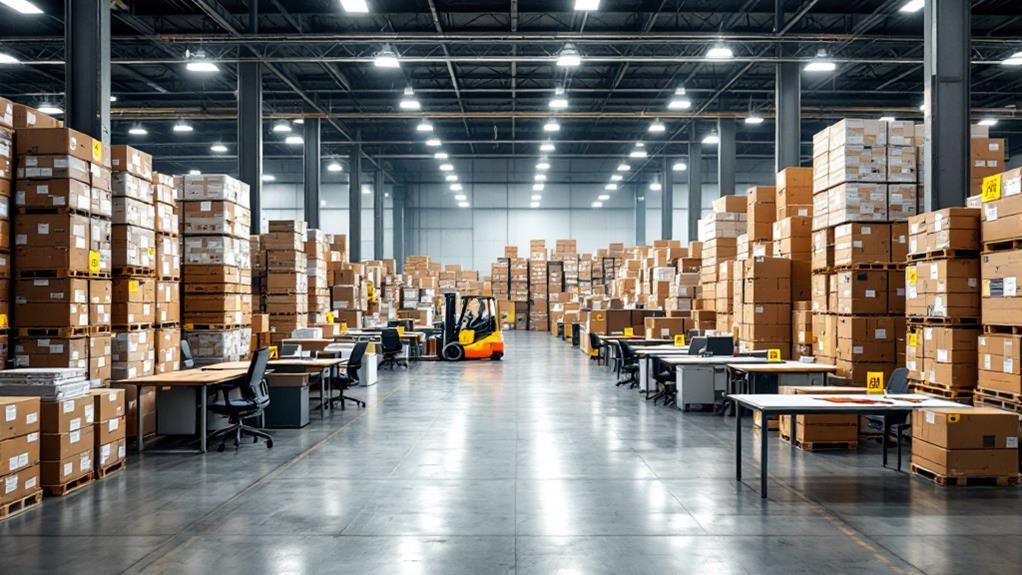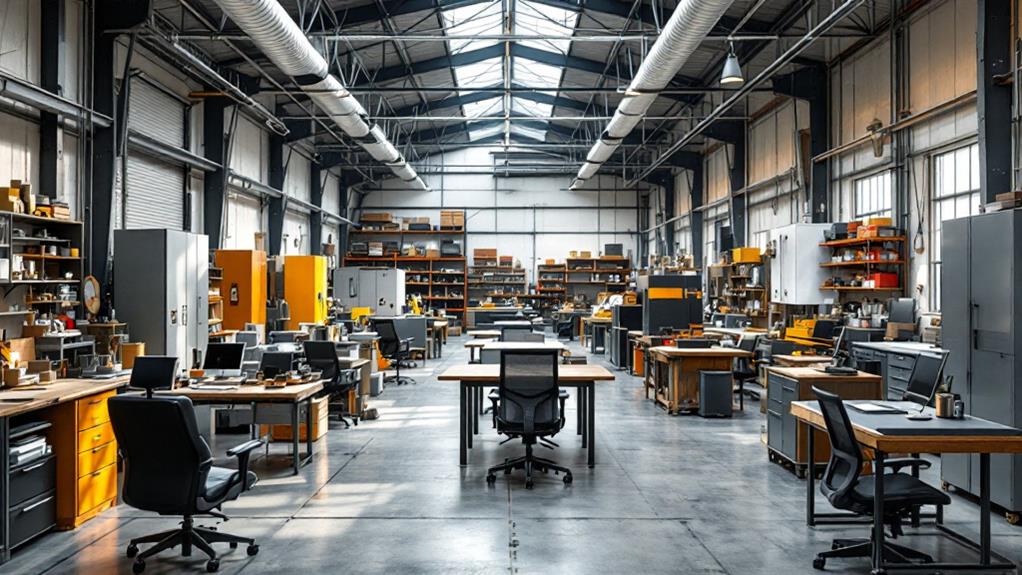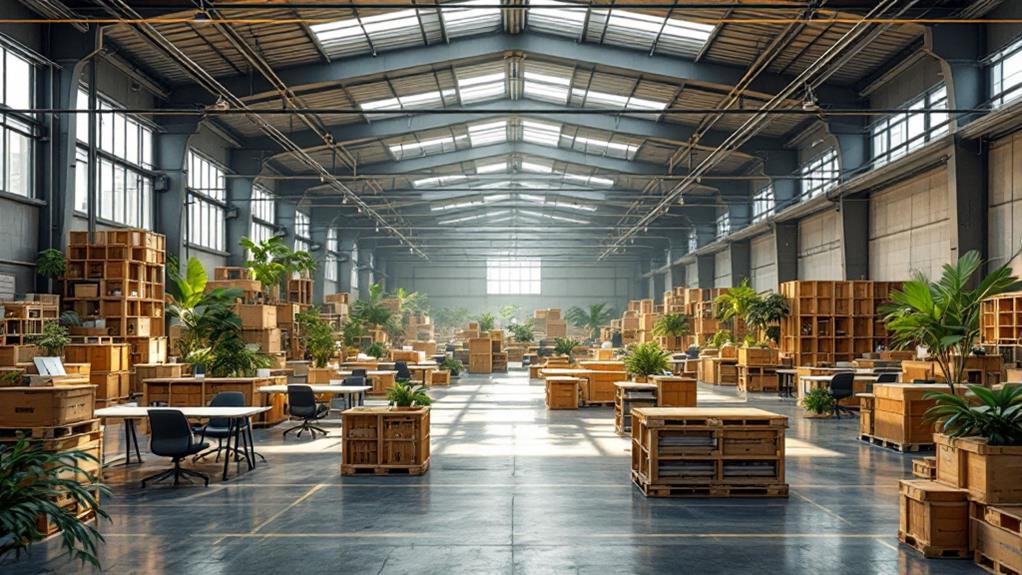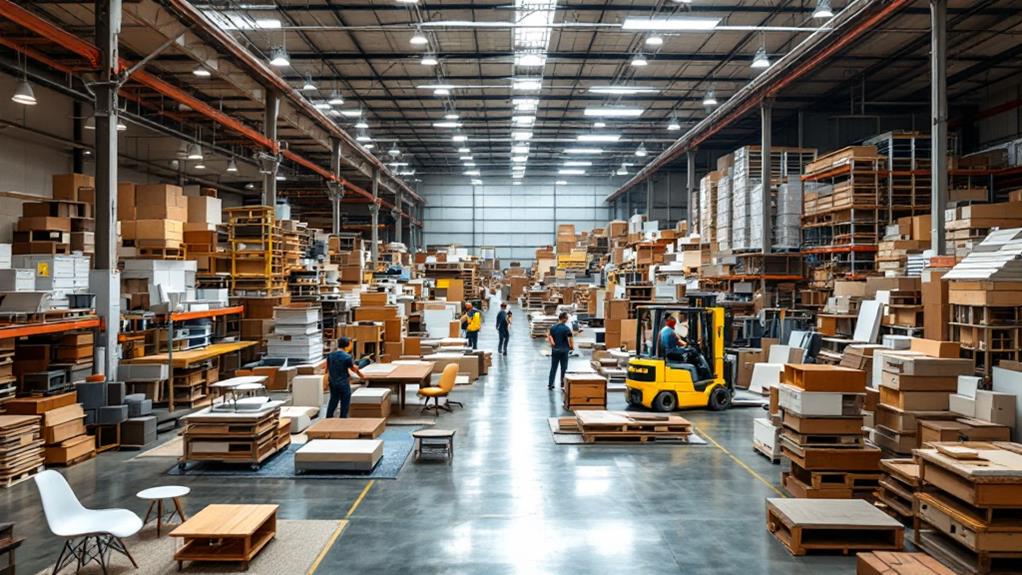When you're buying large quantities of furniture for industrial facilities, consider purchasing directly from manufacturers to cut out middleman costs. This strategy not only secures high-quality products but also opens up bulk purchase discounts, greatly reducing expenses. You'll find a vast array of styles like modern and rustic, with options for customization to meet specific operational needs. Efficient logistics and a focus on customer service guarantee timely delivery and hassle-free setup. Additionally, with flexible payment plans, you can manage cash flow without financial strain. As you explore these strategies, you'll uncover further insights to streamline your purchasing process.
Cost Savings Strategies

When you're looking to furnish industrial facilities, cost savings strategies can make a significant difference in your budget. Purchasing furniture directly from manufacturers in large quantities can lead to substantial savings by cutting out middleman expenses. This approach typically offers lower prices than traditional retail outlets, allowing you to allocate your budget more effectively.
By opting for this method, you gain access to high-quality, handcrafted furniture at wholesale prices, helping maintain a competitive edge without overspending. Additionally, bulk purchasing discounts are often available for large orders, which can further enhance your cost-saving efforts and facilitate budget management.
In addition, stocking up on inventory through bulk orders guarantees that your furnishing projects are cost-effective. This strategy enhances operational efficiency by reducing the frequency of reordering, which can be both time-consuming and expensive. It allows you to maintain a steady supply of furniture, ensuring your facility runs smoothly.
Utilizing wholesale furniture suppliers also supports long-term cost management. The savings achieved can be reinvested into other operational areas, promoting overall business growth.
Bulk Purchase Discounts
Bulk purchase discounts are a key advantage for industrial facilities aiming to optimize their budgets. By ordering furniture in large quantities, you can considerably lower costs through price reductions. Many wholesale furniture suppliers offer tiered discount structures, meaning the more units you order, the larger the percentage discount on your total cost.
This strategy is particularly beneficial when furnishing expansive areas like warehouses or manufacturing plants, as it encourages you to stock up on essential items without breaking the bank.
Leverage bulk purchasing to enhance your profit margins, allowing you to maintain competitive pricing strategies while acquiring high-quality furniture. Reduced costs per unit translate to better budget management and can free up resources for other operational needs.
Additionally, some suppliers might offer exclusive deals or extra incentives for repeat bulk purchases, fostering long-term business relationships and guaranteeing even greater savings over time.
Such arrangements not only boost your financial efficiency but also guarantee a steady supply of necessary furnishings, reducing the risk of disruptions in operations.
Product Variety Options

Selecting the right furniture for industrial facilities isn't just about functionality; it's also about variety. You're looking for options that suit different needs and aesthetics. Wholesale furniture suppliers typically offer a wide range of products ideal for industrial use. These include durable chairs, tables, and storage solutions designed to endure heavy use. The variety guarantees that you can find pieces to fit your operational and stylistic requirements, creating a cohesive and professional atmosphere.
Here's a quick look at some typical offerings:
| Product Type | Durability | Style Options |
|---|---|---|
| Chairs | High | Modern, Traditional |
| Tables | Very High | Contemporary, Rustic |
| Storage Solutions | Extremely High | Industrial, Classic |
Many suppliers also provide a curated selection, enabling you to find unique pieces that enhance your workspace while meeting functional needs. By offering styles from modern to traditional, they cater to diverse preferences. This guarantees that your facility not only operates efficiently but also reflects the desired aesthetic. The ability to choose from a range of styles and products means you can select furniture that fits seamlessly into your existing layout and supports your workflow effectively, maintaining both utility and design harmony.
Customization Capabilities
Customization capabilities offer a remarkable advantage for industrial facilities seeking tailored furniture solutions. Wholesale furniture suppliers often provide extensive customization options, allowing you to tailor designs, materials, and finishes to match your specific needs. This flexibility guarantees that the furniture not only fits your space but also aligns with your brand identity and operational requirements.
Many suppliers accept bespoke orders, which means you can specify dimensions, colors, and styles, creating a cohesive aesthetic across your facility. Custom orders usually come with a minimum order quantity, making it efficient to furnish larger spaces while maintaining a uniform look.
Collaborating directly with manufacturers streamlines the design process, allowing for quicker adjustments and refinements. This direct communication guarantees that your specifications are met accurately, enhancing the functionality of your industrial facility.
Flexibility in customization also helps you stand out in a competitive market. By tailoring furniture to your exact needs, you enhance both the aesthetic appeal and practical utility of your space. This capability not only boosts operational efficiency but also differentiates your facility, offering a distinct advantage over competitors who might opt for standard solutions.
Therefore, customization is a strategic investment in functionality and brand consistency.
Delivery and Fulfillment

While customization capabilities offer a tailored furniture solution for industrial facilities, efficient delivery and fulfillment are equally important to guarantee your project stays on track.
Coordinating logistics efficiently is vital when managing large furniture orders. Working with reliable carriers guarantees timely delivery, helping you meet project deadlines without unnecessary delays. Direct fulfillment from manufacturers can greatly reduce lead times, allowing you to receive furniture more quickly than through traditional retail routes.
Clear communication about shipping timelines and costs is essential for effective planning. Knowing when and how much you're spending helps you organize inventory and manage project schedules efficiently.
Many wholesale suppliers offer flexible assembly options. You can choose between self-assembly or professional services according to your facility's needs, guaranteeing a smooth setup process.
Having control over inventory management through direct relationships with manufacturers can lead to considerable cost savings. This control enhances fulfillment efficiency, providing a more streamlined approach to managing large-scale furniture purchases.
Customer Service Excellence
Delivering exceptional customer service is the cornerstone of a successful relationship between suppliers and industrial facility clients. Transparent return policies are essential, especially when purchasing large quantities of furniture. They build customer confidence by reducing hesitation during the purchase process. Ensuring that clients understand the return process can prevent misunderstandings and foster trust.
Clear warranty details also play a key role in reassuring businesses about their investment. Knowing the specifics of warranty coverage enhances your confidence and strengthens the supplier's brand reputation. This is particularly important for high-volume orders where the financial stakes are higher.
Addressing customer concerns promptly is critical. When you communicate feedback effectively, it demonstrates the supplier's commitment to your satisfaction, ensuring long-term business relationships. Dedicated support for large orders can greatly influence your future purchasing decisions, leading to repeat business.
Encouraging online reviews and seeking feedback are essential strategies for improving service quality. They provide insights into the supplier's ability to cater to your specific needs.
Sustainability Practices

Sustainability practices are becoming an integral part of furniture procurement for industrial facilities. Many suppliers now offer products crafted from recycled or sustainably sourced materials. By choosing these options, you not only meet environmental goals but also furnish your space responsibly.
Using sustainably harvested wood in furniture design reduces the carbon footprint, appealing to the growing market of eco-conscious consumers and businesses.
Implementing recycling or disposal options for old furniture is another critical step in sustainability. This practice helps you manage waste effectively and aligns with broader environmental responsibilities. A study indicates that 73% of consumers are willing to pay more for products made from sustainable materials. This trend suggests that there's a strong market opportunity you can leverage by focusing on sustainability.
Highlighting sustainable practices can enhance your brand's reputation. Clients often prioritize environmental responsibility in their purchasing decisions, so marketing these efforts can attract more business.
Financing and Payment Plans
Financing solutions are essential for industrial facilities looking to outfit their spaces with important furniture without straining their budgets. Flexible payment plans allow you to manage cash flow effectively, spreading the cost of necessary furnishings over time. This prevents the financial burden of large upfront payments, making it easier to invest in the furniture your facility needs.
Utilizing reputable payment gateways is essential for ensuring that transactions for bulk furniture purchases are secure. This security fosters trust, encouraging repeat business. When you offer financing options, you attract a wider range of customers, enabling them to distribute costs over time and avoid large one-time expenses.
It's a strategic move that not only supports your financial strategy but also expands your customer base. Clear communication in your marketing materials about available financing solutions can greatly boost sales conversions. By highlighting these options, you appeal to budget-conscious decision-makers in industrial settings.
Collaborating with financing entities enhances payment flexibility, increasing your purchasing power. This collaboration allows you to buy larger quantities of furniture without compromising financial stability. In conclusion, well-structured financing and payment plans are essential for managing cash flow and expanding purchasing capabilities in industrial facilities.
Frequently Asked Questions
What Are the Benefits of Ergonomic Furniture in Industrial Facilities?
You're increasing productivity by 12-25% with ergonomic furniture. It reduces injuries by 40%, cuts healthcare costs, and boosts employee satisfaction. You'll attract talent and create a healthier, safer work environment, enhancing overall operational efficiency.
How Do I Determine the Right Furniture Size for My Facility?
Measure your facility's dimensions, including floor space and doorways. Consider usage needs like workstations. Get employee feedback on preferences. Use space planning tools to visualize arrangements. Factor in equipment needs to guarantee furniture fits and functions effectively.
Are There Industry-Specific Furniture Recommendations for Safety Compliance?
You should prioritize OSHA-compliant furniture to guarantee safety. Choose ergonomic, adjustable pieces to prevent injuries, anti-slip and stable items for high traffic, and fire-resistant materials. Rounded edges further enhance safety, reducing risks in busy environments.
How Can Furniture Impact Productivity in an Industrial Setting?
You can boost productivity by choosing ergonomically designed furniture to reduce fatigue, modular setups for flexibility, and high-quality pieces that minimize maintenance. Comfortable furniture in break areas enhances morale, leading to more efficient work upon return.
What Are the Best Practices for Furniture Maintenance in Industrial Environments?
You should clean furniture regularly with non-abrasive agents, schedule routine inspections, use protective mats, and choose materials suited for the environment. Train employees on proper care to minimize damage and prolong furniture lifespan.


